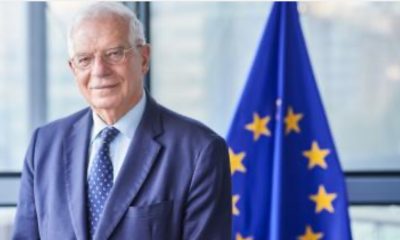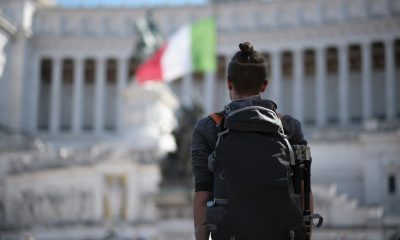feiceáil
# Fóram Eacnamaíoch #Astana arduithe le Dúshláin Dhomhanda


The upcoming Astana Economic Forum in Kazakhstan is a unique opportunity to deal with “unprecedented changes” facing the world, according to MEPs and EU experts. The event from 17-19 May will include more than 200 speakers from more than 27 countries to debate the world’s most important challenges and discuss solutions to create a safer and more sustainable planet.
The name of the forum has been changed this year to the Global Challenges Summit (GCS) 2018. It will host decision makers in politics, business, science, sport, economics, and the arts to discuss the opportunities and risks facing the world.
The gathering follows Astana’s successful Future Energy Expo 2017 where Kazakhstan unveiled its large-scale Third Modernisation, a long-term strategy which aims to push the country into the top 30 of the world's strongest economies.
An insight into what awaits participants at this year’s summit comes from Fraser Cameron, director of the EU-Asia Centre, a leading Brussels-based think tank that aims to foster improved relations between the EU and countries in central Asia.
Speaking to EU Reporter, Cameron said, “I attended the Astana Economic Forum last November and can testify to the high-level quality discussions that take place at these events.”
Cameron, a former European commission adviser and well-known policy analyst and commentator on EU and international affairs, added, “The Astana Economic Forum will have plenty to discuss with the looming trade wars between the US and China and the US and the EU as well as the on-going sanctions against Russia.”
The British-born EU veteran said, “It will be interesting to hear the views of Kazakhstan leaders about the uncertain political and economic prospects for the world.”
The congress, he notes, comes at a time of “unprecedented social and economic progress, progress in the field of digitisation, and rapid technological growth.”
The Astana Economic Forum, an annual event held in the capital of Kazakhstan, is arguably best known as a platform for international dialogue that enables constructive discussion of economic development issues concerning both Central Asia and the world in relation to changes witnessed in the global economy.
A European commission spokesperson pointed to the fact that this year marks the 25th anniversary of diplomatic relations between the EU and Kazakhstan. He said that the Enhanced Partnership and Cooperation Agreement (EPCA) between the two sides was signed in December 2015 with the aim of boosting economic and political ties.
Between 1991-2004, the EU funded more than 350 projects in the country to the value of 180m euros, he said.
He said that the high calibre participants at the summit later this month "demonstrates Kazakhstan's status", adding that the event "is an opportunity to bring together distinguished speakers to discuss the unprecedented technological revolution facing the world."
The main theme of the forthcoming event will be "New Eurasia: Enhancement of Trade and Investment from Shanghai to London".
The showpiece business forum, being held this year at the EXPO Congress Centre and Hilton Astana, is also an ideal showcase for Kazakhstan’s economic achievements and to underline how the country, a founding member of the Eurasian Economic Union, is, for example, making concerted efforts towards setting out a roadmap for reducing its dependence on oil and gas.
Ahead of this year’s summit, further comment comes from Laima Andrikiene, a Lithuanian Member of the European Parliament and Vice-Chair of the European Parliament’s delegation to the EU-Kazakhstan, EU-Kyrgyzstan, EU-Tajikistan, and EU-Uzbekistan Parliamentary Cooperation Committees and for relations with Turkmenistan and Mongolia (DCAS).
The centre-right deputy said the EU perceives Kazakhstan as a “special and important” partner in Central Asia and wants to support the country to further improve its economy and social sector.
The summit takes place with Kazakhstan increasingly a “playground” for important global players such as the EU, China, the U.S., and Russia, she says.
According to Andrejs Mamikins, a Latvian Socialist MEP and member of the European Parliament’s Committee on Foreign Affairs, the event will happen against a backdrop of Kazakhstan being viewed as “a pillar of stability” in Eurasia and a “responsible regional player, an ambitious innovative power and important partner for the EU.”
Another MEP, Grigule-Pēterse, said “I am truly proud that recently The European Parliament has ratified a landmark Enhanced Partnership and Cooperation Agreement partnership deal with Kazakhstan. It is first by its nature with a Central Asian country and represents a new chapter in EU – Kazakhstan relations. When we look at Astana’s urban landscape and events as particular forum, we see the true global role of Kazakhstan in nowadays world.
This year we also celebrate 25th anniversary of diplomatic relations between the European Union and the Republic of Kazakhstan which is important step for mutually prosperous relationship in politics, economics, culture and other fields.
The EU is Kazakhstan`s first trade partner representing over one third of its external trade. Kazakhstan's exports to the EU are almost entirely in the oil and gas sectors, alongside other minerals, chemicals and food products. From the EU, Kazakhstan imports machinery and transport equipment and pharmaceuticals, alongside chemical products, plastics, medical devices and furniture. The EU is also the largest foreign investor in Kazakhstan, representing over 50% of Foreign Direct Investment in Kazakhstan.
I am sure that such influential event as Astana Economic Forum will attract bright minds from all the world and will create new ideas for a closer partnership and development. “
Elsewhere, Ruslan Dalenov, First Vice Minister of National Economy of Kazakhstan says the economic summit is “an opportunity for international dialogue, discussion and brainstorming on a range of economic issues facing Central Asia and the rest of the world.”
An impressive line-up of experts and leaders attending the event include Ban Ki-moon, eighth General Secretary of the United Nations and Chairman of the International Olympic Committee’s Ethics Commission, Hans Timmer, Chief Economist for the Europe and Central Asian region of the World Bank, and former French President Francois Hollande.
Other participants include Michio Kaku, physicist, co-founder of the string field theory and populariser of science, Jim O'Neill, former chief economist of Goldman Sachs who is known for coining the BRIC acronym, Parag Khanna, international relations expert and visionary strategist of urban development, Mikheil Janelidze, Vice Prime Minister and Minister of Foreign Affairs of Georgia, Toomas Ilves, ex-president of Estonia, Krzysztof Zanussi, film director and winner of the Golden Lion, the highest prize of the Venice Film Festival.
They will join some of Kazakhstan’s most senior executive officials and chief executives of state-owned companies and development agencies in discussing the country’s strategies for adapting to the rapidly changing world and its role in developing the Central Asia region.
Bulat Stolyarov, Managing Partner, GVA Kazakhstan, told EUReporter: “The Astana Economic Forum has been relaunched this year as the 2018 Global Challenges Summit. The city of Astana is now celebrating its 20th anniversary as the capital of Kazakhstan and this year celebrated the opening of the new International Financial Centre. The main trends of the Forum are economic growth and resource resilience, digitization and urbanization, longevity and the financial revolution, global security and cultural change. The Forum will bring together hundreds of speakers including prominent politicians, businesspersons and scholars, along with the thousands of experts taking part in the forum. This is the first large-scale event on the subject of global challenges in the Central Asian region.
"The Forum has been Central Asia’s main business summit since 2008 and during that time the Republic of Kazakhstan has transformed from a rapidly developing post-Soviet state to a global leader. Thanks to its geographical position in Central Asia, the country has taken on the role of the region’s hub, establishing partnerships with businesses from Russia, China, the UAE, Turkey, Korea, Uzbekistan, Georgia and Tajikistan.
"Kazakhstan is on the cusp of a capital transformation and is now undergoing a major privatisation programme. As of 1 January 2018, 902 companies are included in the country’s privatisation plan. It is expected that the 2016-2020 privatisation plan will be completed by the end of 2018, with roadmaps developed to execute each privatisation deal.”
Over the past decade, more than 50,000 delegates from 150 counties attended the annual congress, including 20 Nobel Prize winners and more than 30 prominent politicians, and over 300 memoranda and agreements totalling US20 billion have been signed.
A spokesperson for the summit organisers said, “The unprecedented technological revolution of recent years created world changing megatrends which are affecting every country, business and human being on the planet. Economic growth and resource resilience, digitalisation and urbanisation, longevity and the financial revolution, global security and cultural shift – will all be discussed at the summit.”
Comhroinn an t-alt seo:
-

 ComhdhálachaLá ó shin 3
ComhdhálachaLá ó shin 3Chuir póilíní na Bruiséile stop le comhdháil ar-uaire NatCon
-

 Faireachas maisLá ó shin 4
Faireachas maisLá ó shin 4Sceitheadh: Teastaíonn ó airí inmheánacha an AE iad féin a dhíolmhú ó bhulcscanadh rialaithe comhrá ar theachtaireachtaí príobháideacha
-

 ComhdhálachaLá ó shin 4
ComhdhálachaLá ó shin 4Comhdháil NatCon le dul ar aghaidh ag ionad nua sa Bhruiséil
-

 An tSeirbhís Eorpach Gníomhaíochta Seachtraí (EAAS)Lá ó shin 4
An tSeirbhís Eorpach Gníomhaíochta Seachtraí (EAAS)Lá ó shin 4Scríobhann Borrell a phostthuairisc
























